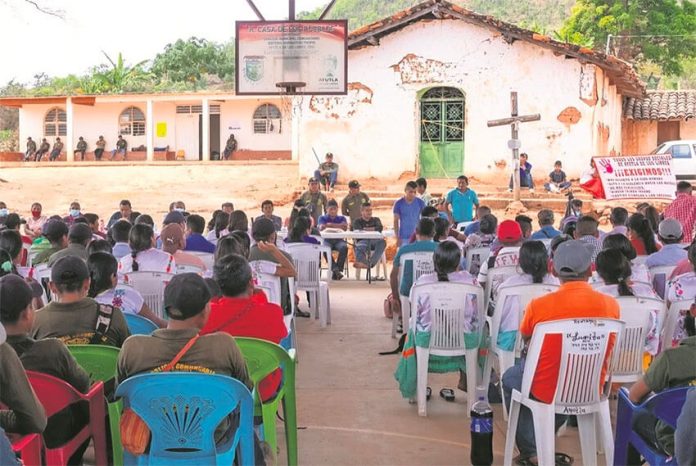The indigenous governing code known as usos y costumbres offers the justice system of choice for some Guerrero residents and there was evidence on the weekend that it can work.
A 19-year-old Guerrero man who murdered his girlfriend in January was sentenced to 25 years in jail after local officials and residents in the Costa Chica municipality of Ayutla agreed to the decision at a community assembly on Saturday.
Roberto Lucas confessed to killing his girlfriend with a machete on January 1. Roberto and Ángeles had attended a dance and got in an argument on their way home, according to Rogelio Teliz, lawyer with the Montaña Tlachinollan Human Rights Center.
Roberto was arrested by community police shortly after he committed the crime and pleaded guilty at an initial hearing on January 15.
During his 25-year jail term, Roberto will live in a cell at a facility known as the Casa de Justicia (Justice House). He will be allowed out to complete community work and has been ordered to learn a trade.
Roberto was sentenced by local officials and residents in accordance with usos y costumbres because they have little faith in state authorities and the conventional justice system.
Teliz said that Ángeles’ parents refused to allow the Guerrero Attorney General’s Office (FGE) to investigate and prosecute the crime due to their lack of confidence in that authority. On their request, the case was assigned to the community police force known as CRAC.
Teliz said that a life sentence was considered but officials and residents followed two precedents in deciding on a prison term of 25 years. Two other Ayutla men who were found guilty of femicide in 2018 and 2019 also received 25-year prison sentences.
Teliz said he would have supported a harsher sentence given that the conventional justice system jails perpetrators of femicide for 40 to 60 years.
“I think that the sentence could have been longer, but in the towns there is still a need to assign more seriousness to these cases and to work on them being considered with a gender perspective,” he said.
Nevertheless, a 25-year sentence is better than no punishment at all. Teliz said there have been eight femicides in Ayutla in the past three years and none of those investigated by the FGE has resulted in sentences against the perpetrators.
“In the traditional system the investigations are open but abandoned, without progress, without sentences,” he said.
“In some cases there are not even people who have been detained and that generates a lot of distrust among people,” the lawyer said.
Of 902 murders of women in Guerrero between 2017 and 2021, only 77 were classified as femicides and the perpetrators of just six of those crimes were sentenced, according to feminist and human rights organizations.
Ayutla is one of seven municipalities in Guerrero where a gender alert has been in place since 2017 due to high levels of violence against women.
Last November, the federal government’s women’s rights agency launched a strategy to prevent violence against women and girls in the Montaña and Costa Chica regions of Guerrero, where forced marriages continue to take place.
But gender violence persists in the southern state. Four women were murdered between March 22 and 28, the newspaper El Universal reported. Three of the murders were reported in Acapulco, which borders the Costa Chica region, while one took place in the municipality of San Luis Acatlán, which adjoins Ayutla.
With reports from El Universal
